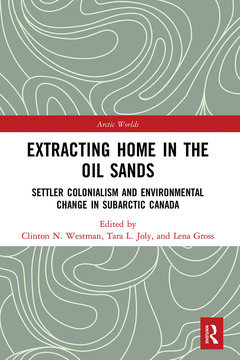Extracting Home in the Oil Sands Settler Colonialism and Environmental Change in Subarctic Canada Arctic Worlds Series
Coordonnateurs : Westman Clinton, Joly Tara, Gross Lena

The Canadian oil sands are one of the world?s most important energy sources and the subject of global attention in relation to climate change and pollution. This volume engages ethnographically with key issues concerning the oil sands by working from anthropological literature and beyond to explore how people struggle to make and hold on to diverse senses of home in the region. The contributors draw on diverse fieldwork experiences with communities in Alberta that are affected by the oil sands industry. Through a series of case studies, they illuminate the complexities inherent in the entanglements of race, class, Indigeneity, gender, and ontological concerns in a regional context characterized by extreme extraction. The chapters are unified in a common concern for ethnographically theorizing settler colonialism, sentient landscapes, and multispecies relations within a critical political ecology framework and by the prominent role that extractive industries play in shaping new relations between Indigenous Peoples, the state, newcomers, corporations, plants, animals, and the land.
ListofFigures; Foreword; Preface; Introduction: At Home in the Oil Sands; 1. Uncertain Sovereignty: Treaty 8, Bitumen, and Land Claims in the Athabasca Oil Sands Region; 2. Living and Dying through Oil’s Promise: The Invisibility of Contamination and Power in Alberta’s Peace River Country; 3. Northern Respectability: Whiteness and Improvement in Fort McMurray; 4. Wastelanding the Bodies, Wastelanding the Land: Accidents as Evidence in the Albertan Oil Sands; 5. Wildfire Politics: The Role of a Natural Disaster in Indigenous–State Relations; 6. Bear Stories in the Berry Patch: Caring for Boreal Forest Cycles of Respect; 7. Urban Buffalo: Métis–Bison Relations and Oil Sands Extraction in Northeastern Alberta; 8. Reclaiming Nature? Watery Transformations and Mitigation Landscapes in the Oil Sands Region; Conclusion: Studying the Social and Cultural Impacts of "Extreme Extraction" in Northern Alberta; Index
Clinton N. Westman is an environmental anthropologist and Associate Professor in the Department of Archaeology and Anthropology at the University of Saskatchewan, Canada.
Tara L. Joly is Research Director at Willow Springs Strategic Solutions, Inc. in Cochrane, Alberta, Canada. She recently received her PhD in social anthropology from the University of Aberdeen, UK.
Lena Gross recently completed her PhD in social anthropology at the University of Oslo, Norway.
Date de parution : 08-2021
15.6x23.4 cm
Date de parution : 12-2019
15.6x23.4 cm
Thèmes d’Extracting Home in the Oil Sands :
Mots-clés :
Mature Fine Tailings; Peace River; Oil Sands; Young Man; Alberta; Open Pit Mine Planning; Canada; Top Secret; Canadian; Arctic; Oil Sands Area; Resources; Oil Sands Industry; Tar; Oil Sands Extraction; Extraction; Oil Sands Region; Extractive; Northern Alberta; Industry; Treaty Rights; Fossil Fuels; Fort Chipewyan; Environment; Wood Bison; Nature; Berry Patches; Forest; Tailings Ponds; Energy; Wood Buffalo; Climate Change; Athabasca Region; Land; Oil Sands Projects; Indigenous; Impact Benefit Agreements; Settler Colonialism; Material Consideration; Multispecies; Alberta Government; Activism; Rupert’s Land; Political Ecology; Wood Buffalo National Park; Ethnography; North West Territories; Anthropology; Environmental Studies; Environmental Geography; Routledge; Canadian oil sands; human-environmental relations; sentient landscapes


